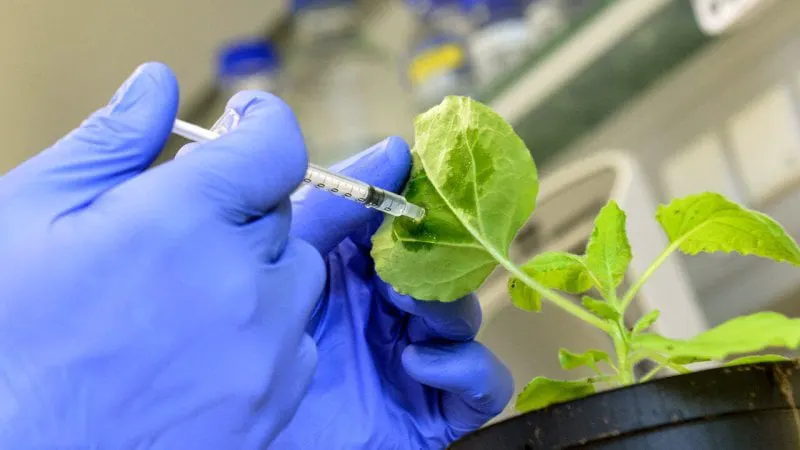Video: Vaccines are rescuing the world from COVID. Could they also protect food crops from deadly plant diseases and pandemics?
Video: Vaccines are rescuing the world from COVID. Could they also protect food crops from deadly plant diseases and pandemics?


Preventing plant-disease outbreaks is an urgent matter — as urgent as having a rapid response strategy for human viruses. The same factors that quickly allow new human viruses to spread world-wide — global trade, traffic, and transport — also allow crop pathogens to spread.
…
Crop “vaccines” could be the answer to fighting off quickly evolving pathogens, without genetically engineering the crop itself.
When a virus infects a plant cell, it often releases RNA — either in the form of messenger RNA or double-stranded RNA — which travels through the cell, helping the virus replicate. The resistance proteins can act like targeted scissors, that find the invader RNA and slice it to small pieces. Those small pieces (small interfering RNAs) are then used by the plant to find and target the viral RNA for destruction.
The sequence of small interfering RNAs can be predicted by computers and synthesized in a lab. The resulting nucleic acid cocktail can be applied directly to plant leaves — as a spray.
Studies are being carried out for these “non-transformative” (i.e. not genetic engineering) approaches to control insects, diseases, nematodes, and weeds, and it is expected that RNAi-based products will reach the market in the form of sprayable products for foliar application, trunk injection, root dipping, or seed treatment as direct control agents soon.
Read the original post

 | Videos | More... |

Video: Nuclear energy will destroy us? Global warming is an existential threat? Chemicals are massacring bees? Donate to the Green Industrial Complex!
 | Bees & Pollinators | More... |

GLP podcast: Science journalism is a mess. Here’s how to fix it

Mosquito massacre: Can we safely tackle malaria with a CRISPR gene drive?

Are we facing an ‘Insect Apocalypse’ caused by ‘intensive, industrial’ farming and agricultural chemicals? The media say yes; Science says ‘no’
 | Infographics | More... |

Infographic: Global regulatory and health research agencies on whether glyphosate causes cancer
 | GMO FAQs | More... |

Why is there controversy over GMO foods but not GMO drugs?

How are GMOs labeled around the world?

How does genetic engineering differ from conventional breeding?
 | GLP Profiles | More... |

Alex Jones: Right-wing conspiracy theorist stokes fear of GMOs, pesticides to sell ‘health supplements’




 Trust issues: What happens when therapists use ChatGPT?
Trust issues: What happens when therapists use ChatGPT? Fighting deforestation with CO2: Biotechnology breakthrough creates sustainable palm oil alternative for cosmetics
Fighting deforestation with CO2: Biotechnology breakthrough creates sustainable palm oil alternative for cosmetics California, Washington, Oregon forge immunization alliance to safeguard vaccine access against federal undermining
California, Washington, Oregon forge immunization alliance to safeguard vaccine access against federal undermining Viewpoint — Fact checking MAHA mythmakers: How wellness influencers and RFK, Jr. undermine American science and health
Viewpoint — Fact checking MAHA mythmakers: How wellness influencers and RFK, Jr. undermine American science and health 30-year-old tomato line shows genetic resistance to devastating virus
30-year-old tomato line shows genetic resistance to devastating virus Viewpoint: Video — Big Solar is gobbling up productive agricultural land and hurting farmers yet providing little energy or sustainabilty gains
Viewpoint: Video — Big Solar is gobbling up productive agricultural land and hurting farmers yet providing little energy or sustainabilty gains The free-range chicken dilemma: Better for birds, but with substantial costs
The free-range chicken dilemma: Better for birds, but with substantial costs ‘You have to treat the brain first’: Rethinking chronic pain with Sanjay Gupta
‘You have to treat the brain first’: Rethinking chronic pain with Sanjay Gupta
